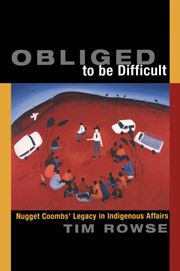Book contents
- Frontmatter
- Contents
- Acknowledgements
- Introduction
- 1 The modest mandate of 1967
- 2 ‘Land ownership for Aborigines presents difficult problems’
- 3 Mediating the Yolngu
- 4 Voice and feet
- 5 North and south
- 6 A national indigenous leadership?
- 7 Clans and councils
- 8 ‘As nasty a piece of chicanery as I can remember’
- 9 Effectively Aboriginal
- 10 An indigenous public sphere
- 11 From James Cook to Eva Valley
- 12 The 1940s in the 1990s
- Conclusion: Beyond Howard, Hanson and Herron
- References
- Notes
- Index
8 - ‘As nasty a piece of chicanery as I can remember’
Published online by Cambridge University Press: 01 June 2011
- Frontmatter
- Contents
- Acknowledgements
- Introduction
- 1 The modest mandate of 1967
- 2 ‘Land ownership for Aborigines presents difficult problems’
- 3 Mediating the Yolngu
- 4 Voice and feet
- 5 North and south
- 6 A national indigenous leadership?
- 7 Clans and councils
- 8 ‘As nasty a piece of chicanery as I can remember’
- 9 Effectively Aboriginal
- 10 An indigenous public sphere
- 11 From James Cook to Eva Valley
- 12 The 1940s in the 1990s
- Conclusion: Beyond Howard, Hanson and Herron
- References
- Notes
- Index
Summary
In the Alligator Rivers region of the Northern Territory – some of it pastoral land, much of it within the Arnhem Land Reserve – uranium had been discovered in the late 1960s. Less than a fortnight before the day (11 November 1975) the Whitlam government lost office, its statutory authority, the Australian Atomic Energy Commission, joined with Peko Mines Ltd and Electrolytic Zinc Company of Australasia to form Ranger Uranium Mines Pty Ltd. Ranger's uranium deposit was one of four in the region. To its south was Koongarra (over which Noranda Australia held an exploration licence), to its north and north-east, Jabiluka (Pancontinental Mining) and Nabarlek (Queensland Mines). Those aspiring to dig up uranium had to compete with two other land use interests. Conservationists thought mining would compromise the region's biological richness, cultural significance and scenic beauty, and they feared the nuclear fuel cycle's many hazards to human health. Aboriginal people assumed their right to remain on their land and to continue using it according to their own customs. The political pressures of this intensely conflicted field soon exposed the fragility of Australian governments' commitment to indigenous land rights. Though concessions were made both to Aborigines and environmentalists, the miners' interests were paramount. By December 1978, Coombs admitted to being ‘profoundly depressed’ about the bullying of the region's traditional owners.
An Act to facilitate mining
That land rights might be compromised in ‘the uranium province’ (as the Alligator Rivers region was sometimes known) occurred to Coombs, Dexter and Stanner in 1975.
- Type
- Chapter
- Information
- Obliged to be DifficultNugget Coombs' Legacy in Indigenous Affairs, pp. 149 - 161Publisher: Cambridge University PressPrint publication year: 2000



